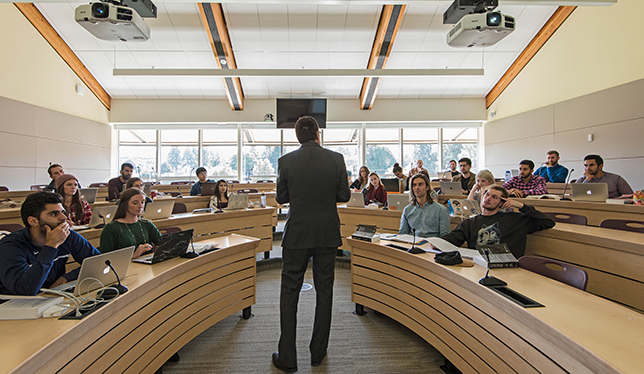The right software and hardware tools for modern education from Microsoft
Institutions, professors and students alike can take advantage of complete and integrated solutions that provide cost and productivity benefits.

It’s hard to imagine that mobile and cloud technology broke into the scene about ten short years ago. Education has been experiencing the future shock of integrating new tech and the way it has fundamentally brought about new ways to teach and learn ever since. It’s only now that it seems like the technology is finally hitting its stride.
Institutions, professors and students alike can take advantage of solutions that provide cost and productivity benefits. Things that were traditionally done manually can now be facilitated by cloud services like Office 365. For example, assignments can be marked digitally, and collaborative creation on research and assignments can be done in real time. New form factors also let users work where they want without relying on the traditional office and desk environment.
Since Microsoft announced the original Surface Pro, they’ve expanded their complete device lineup (Surface Pro, Surface Laptop, Surface Book, Surface Hub and HoloLens) to meet the evolving challenges that institutions and educators face.

What are these challenges?
At the institutional level, security/privacy/compliancy is a huge challenge. Microsoft’s three key pillars of security include identity protection, threat resistance, and information protection.
One form of identity protection is the password that you use to sign in to your device. Passwords can be insecure. Users tend to keep the same password for a long time, they might use the same password for multiple services, or they use one that’s too easily guessed. However, the most secure authentication method is your presence. Windows Hello is a feature that, when used with a compatible camera like the one in a Surface device, simply uses your face as a biometric identification system to quickly and conveniently sign in. It can also use fingerprint readers built right on the keyboard in conjunction with an easy to remember PIN.
Gartner’s report on features like this show that institutions running Windows 10 see improved security as one of the biggest benefits.
In terms of cost, a total economic impact study by Forrester showed significant benefits in the form of device cost avoidance and productivity improvements. The report estimated that each Surface Pro device replaces 1.7 devices since a desktop, laptop and tablet need not be purchased for the employee.
For educators, challenges include wanting to increase efficiency in daily activities and improving ease-of-use in the devices that they use every day. The mobile devices in the Surface lineup (Surface Pro, Surface Book, and Surface Laptop) are thin, light and portable options that provide full PC power and up to 14.5 hours of battery life. In the Forrester study cited earlier, 90% out of 780 respondents agree or strongly agree that they are able to get more done away from their desk, and were able to “more easily take advantage of in-between times” because of the form factor. Not on the go? You can connect to a Surface Dock for extra USB ports and external monitor usage at your desk.
In addition, the Surface family of devices uses the Surface Pen as a stylus. “Digital Inking” in education affords significant benefits in time management and instruction preparation, and ease of marking digitally submitted exams and assignments. For art or engineering schools, the Surface Studio is a great fit. The user can adjust the screen to use it as a standard desktop or lay it down like a drafting canvas. Not only is this a more natural way to work, it’s a single device solution that normally required both a computing device and a separate accessory tablet.
As for students, some of their challenges can include finding ways to collaborate better with their professor and fellow students and improving engagement in the lesson content. How can institutions and educators empower them in this area? Surface Hub is a combination multi-touch display, digital ink canvas, digital whiteboard presentation screen and videoconferencing station with productive and collaborative software tools like Office and Windows apps. The University of Bristol recently adopted the Surface Hub to not only better student teaching and learning, but also attributed it as a key tool for success in furthering their biomedical and clinical science research.
Perhaps the most exciting device in the lineup for teaching and learning is the Microsoft HoloLens, which allows users to experience mixed reality; a blending of the physical and digital environment. Rather than using a traditional mouse and keyboard, HoloLens uses more natural ways of interacting, with gesture, voice and gaze navigation. Case Western Reserve University is developing a full digital anatomy curriculum for use with HoloLens, where students can see and interact with intricate human anatomy, unobstructed and undamaged by autopsy, in 3D.
If you’d like to learn more about how Microsoft tools can empower modern education, we’d love to hear from you at [email protected].




Post a comment
University Affairs moderates all comments according to the following guidelines. If approved, comments generally appear within one business day. We may republish particularly insightful remarks in our print edition or elsewhere.